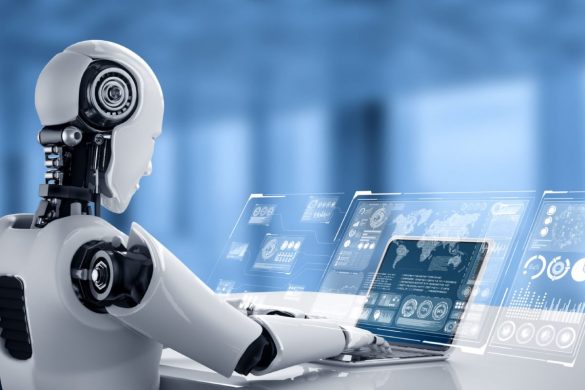In terms of business, artificial intelligence can automate tasks, improve decision-making processes, boost efficiency and optimize workflows. However, this is just the beginning. In this post, we’ll explore five benefits of artificial intelligence in the workplace, how different industries are adopting this technology, and how you can learn more in artificial intelligence courses.
Table of Contents
What is Artificial Intelligence?
Let’s begin with the basics: Artificial intelligence simply refers to the ability of machines to perform tasks that would otherwise rely on human intelligence, such as understanding natural language and recognizing objects. This technology is utilized in various industries, including healthcare, finance, retail, and manufacturing—we’ll tell you how later in this post. In the workplace, artificial intelligence can assist with human resources, marketing, and customer service tasks.
Types of AI
There are many different types of artificial intelligence, but some of the most common are machine learning, natural language processing, and computer vision.
Machine learning
Machine learning is artificial intelligence that lets machines learn from data and improve their performance over time. This is done by using algorithms to automatically detect patterns in data and then make predictions or recommendations based on those patterns. Machine learning is also proven to be very effective in predictive maintenance, as it can detect patterns that may indicate a future problem.
NLP
Natural language processing (NLP) is artificial intelligence that enables computers to understand human language. NLP helps with tasks such as sentiment analysis (understanding whether a text is positive or negative), topic classification (classifying a text by its topic), and machine translation (translating a text from one language to another).
There are many ways businesses can utilize NLP. For example, a customer service chatbot can use NLP to understand customer queries and provide accurate responses. Further, companies can use NLP for text analytics to understand customer sentiment from social media posts or reviews.
Computer vision
Computer vision enables computers to interpret and understand digital images. This is done using algorithms to detect features in pictures and then identify objects, faces, or scenes. Businesses use computer vision to automatically label images, track inventory, and even see fraudulent activities.
Benefits of Artificial Intelligence in the Workplace
Here are five of the most notable benefits of utilizing artificial intelligence in the workplace.
1. Automation of Tasks
Artificial intelligence can automate tasks. This can free up employees’ time to focus on more important assignments. An AI system can be employed to do this quickly and accurately. If a task is repetitive and time-consuming, there’s a good chance AI can be used to automate it.
2. Improved Decision-Making
AI can improve decision-making in the workplace. By analyzing data and recognizing patterns, artificial intelligence can provide employees with insights they may have missed. This helps businesses save time and money by making more informed decisions.
3. Boosted Efficiency
Another benefit of artificial intelligence is its ability to boost efficiency in the workplace. For example, if you’re managing a large team, AI can monitor employee performance and identify areas where they need improvement. This information can help make changes that will increase productivity and optimize workflows.
4. Optimized Workflows
As mentioned above, AI can optimize workflows in the workplace. By analyzing data and recognizing patterns, artificial intelligence can help businesses identify bottlenecks and inefficiencies in their processes. With this information on hand, it can then be used to make changes that will improve efficiency and productivity.
Some examples include:
- Introducing new software or applications that can automate tasks
- Modifying existing processes to eliminate bottlenecks
- Implementing changes to improve communication and collaboration
5. Increased ROI
Finally, artificial intelligence can increase businesses’ return on investment (ROI). For example, if you’re a retailer, you can use AI to personalize your customers’ shopping experience and recommend products they’re likely to purchase. This can lead to increased sales and customer satisfaction. Not to mention, AI can also be used to detect fraud and reduce operational costs. So it’s no wonder that businesses are adopting artificial intelligence across industries.
Now that we’ve explored some of the benefits of artificial intelligence in the workplace let’s examine how different industries are adopting this technology.
How Different Industries Are Adopting Artificial Intelligence
Artificial intelligence is still in its early stages of development. However, many industries are already using this technology to improve their operations.
Here are a few examples:
Healthcare
One industry that’s been quick to adopt artificial intelligence in healthcare. This is because AI can assist with improving patient care and treatment in profound ways. For example, AI can help diagnose diseases, predict patient outcomes, and recommend treatments. In addition, AI can be used to develop new drugs and therapies.
Finance
Another industry that’s benefitting from artificial intelligence is finance. AI can help automate tasks like financial analysis and risk assessment. In addition, AI can identify fraud and improve customer service. Some financial services are also using AI to develop new products and services.
Retail
The retail industry is also adopting AI at a fast pace. Retailers are using AI to personalize the shopping experience for their customers and recommend products they’re likely to purchase. In addition, AI can detect fraud and optimize stock levels.
Manufacturing
Manufacturing is another industry that’s making use of artificial intelligence. AI can improve production planning and quality control. Some manufacturers are using AI to automate their factories.
Human Resources
HR professionals use AI to track workplace program effectiveness and forecast headcounts, and invest in benefits administration tools to streamline compensation plans.
Conclusion
As you can see, artificial intelligence is being adopted by a variety of industries for a number of different purposes. Therefore, ongoing education in the applications for artificial intelligence, including registering in artificial intelligence courses, is essential for business leaders who want to keep up and get ahead.


